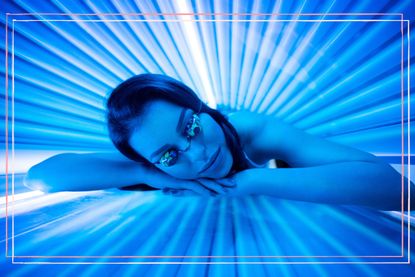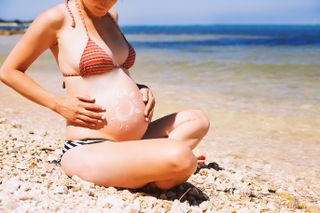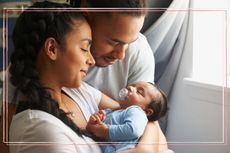Are sunbeds safe in pregnancy? We asked an expert to talk us through all you need to know
We've asked the experts about the risks of sunbeds during pregnancy


Pregnant or not, sunbeds are associated with some serious health risks. We've asked an expert to explain everything you need to know.
Whether you're sick of grey and miserable weather leaving you feeling pale and pasty or you've got a special occasion coming up that you want to have a golden glow for, many people feel their best when they're looking sunkissed - which is why the best fake tans are so popular. But given its tendency to look orange and streaky (not to mention the hassle of removing fake tan before you get that 'tiger bread' look), many prefer the real thing to a bottled glow. But if a couple of weeks in a hot country isn't in your future, then you might be tempted to try a sunbed.
If you're pregnant, this might be particularly appealing. Unless you're prepared to take your newborn on a flight - which many parents aren't - chances are you won't be seeing scorching sun anytime soon (and even if you are, the demands of caring for a baby may leave you with little time for sunbathing). However, just like lying out in the sunshine comes with its risks (in the UK almost 9 in 10 cases of melanoma skin cancer could be prevented by staying safe in the sun, according to Cancer Research), so does using sunbeds.
This is especially true in pregnancy, when skin is often more sensitive than usual. We've spoken to Dr Ross Perry, founder and medical director of Cosmedics and skin cancer specialist, to find out about the risks of using sunbeds during pregnancy.
Are sunbeds safe in pregnancy?
The short answer is no, sunbeds aren't safe during pregnancy. Although there is currently no clear evidence about the effect of UV rays from sunbeds on an unborn baby, you may be more likely to burn if you use a sunbed while pregnant.
Dr Ross Perry explains, "First of all, sunbeds are dangerous whether you are pregnant or not, because they can cause skin cancer and also result in premature ageing. Using sunbeds whilst pregnant is really dangerous as the skin is much more sensitive and therefore you run the risk of burning the skin more easily - and just one sunburn can lead to skin cancer later down the line."
Dr Perry adds that hormone changes during pregnancy can lead to skin pigmentation issues, which can actually become permanent. And while research is limited when it comes to the effects of sunbeds on unborn babies, there is a possible link between increased UV exposure and folic acid deficiency. Dr Perry says, "Particularly in the early days of pregnancy, folic acid is necessary in the development of the baby’s brain and spinal chord and other birth defects, so it’s really not worth taking the risk."
What are the risks of using sun beds?
- Prolonged exposure to UV rays increases your risk of developing malignant melanoma, the most serious form of skin cancer
- Too much UV radiation is the third biggest cause of cancer and the main cause of skin cancer in the UK
- UV rays can also damage your eyes, causing problems such as irritation, conjunctivitis or age-related cataracts, particularly if you do not wear goggles
- Over-exposure to UV has been linked with permature aging of the skin, giving it a rough, leathery and wrinkled look
- People with a lighter skin tone, lots of moles or freckles, a history of skin cancer or a history of sunburn are more at risk
Is it safe to sunbathe while pregnant?
The NHS explains that, sometimes, using a sunbed can be more harmful than sunbathing outside. For example, many sunbeds give out greater doses of UV rays than the midday Mediterranean sun.
GoodtoKnow Newsletter
Parenting advice, hot topics, best buys and family finance tips delivered straight to your inbox.
However, this doesn't mean that it's safe to sunbathe while pregnant, because your skin is likely to be more sensitive than usual. This means you have a higher risk of burning, which can lead to skin cancer.
In addition, Dr Ross Perry told us, "Prolonged periods in the sun can also lead to dehydration, which can be really dangerous when you’re pregnant. The skin is also more prone to hyperpigmentation during pregnancy [known as 'the mask of pregnancy', many notice a darkening of the skin on the face], so although it’s great to get that dose of vitamin D, you shouldn’t be spending longer than 15 minutes in the direct sunlight, especially during the hotter months."
Is it safe to use fake tan while pregnant?
It's generally considered safe to use fake tan creams and lotions during pregnancy. Dr Ross Perry told us, "Using fake tan when pregnant is entirely safe. The main ingredient in fake tan is dihydroxyacetone and this isn’t able to penetrate beyond the outer layer of the skin, and therefore cannot harm an unborn baby."
However, it's probably best to avoid spray tans, because the effects of inhaling the spray are not known.
You should also be aware that while there are no risks to your baby when using fake tan during pregnancy, hormone changes may mean that you develop an allergic reaction to it. Again, this is because your skin may be more sensitive.

Debunking sunbed myths
Sunbed tanning is safer than sun tanning
False! Sun beds are not a 'safe' alternative to sun tanning. Sunbeds give out ultraviolet (UV) rays just like the sun and exposure to UV rays - whether from the sun or a sun bed - damages the DNA in your skin cells. In fact, the strength of UV rays from sunbeds can be up to 10-15 times higher than that of the midday sun.
Building up a sunbed tan gradually means I'm tanning safely
False! Unfortunately, using sunscreen or limiting your time on a sun bed will not protect your skin from damage and ageing. Actually, short periods of intense, irregular exposure to UV (as happens on a sun bed) is the fastest way to damage your skin.
A tan will protect me from the sun on holiday
False! A tan offers a very small protection from sunlight or burning, regardless of how you got it. A sunbed tan is about equal to a sunscreen with SPF of just 2-4 - and that's just not enough to keep you safe in the sun. And if you don't tan easily in the sun, you won't tan easily on a sun bed, no matter how carefully you do it.
I need a sun bed to produce vitamin D
False! Vitamin D is needed for good health and is produced by your skin when it is exposed to UV rays as well as being present in certain foods. Just a few minutes of sun on our skin produces enough vitamin D, so you certainly don't need a sunbed to get your vitamins!
For most people if you build up normal levels during the summer, our bodies store enough of the vitamin to last us through the winter. If you are worried about your vitamin D levels, talk to your doctor about changing your diet, getting out and about more, or taking vitamin supplements.
Being tanned is a sign of health
False! The simple fact that your skin has changed colour is a sign that it has been damaged. UV from sunbeds not only harms your skin, but, without goggles, it can also damage your eyes and lead to irritation, conjunctivitis and eye cancer.
I need to burn to get a tan
False! Burning or going red under a sun bed is a sign that you have seriously damaged your skin. UV light can get deep into the skin's layers and damage the DNA in our skin cells. Cells damaged by UV are at greater risk of contracting cancer. If you have fair or freckly skin that tends to burn, you are at even greater risk of damaging your skin cells.
The more time I spend on sunbeds, the better my tan will look
False! We each have our own tanning limits. No matter how much UV light you get there comes a point when your skin won't get any darker. Boosting your tan by having two sun bed sessions within 24 hours or after sunbathing is particularly bad for you.
I'm young - skin damage from sunbeds is not something I need to worry about
False! You can't always see the damage that UV does straight away as it builds up over time, but every time you use a sunbed you are harming your skin and its appearance in the long run, and this damage cannot be reversed.
In fact, Cancer Research has revealed that young people are particularly at risk when they use sunbeds. People who started using sunbeds before the age of 35 were 87 per cent more likely to develop melanoma compared to people who have never used a sunbed.

Ross qualified at Guy’s & St Thomas’ Hospital Medical School in 1994 and pursued a surgical career that now comprises NHS skin cancer reconstruction and private cosmetic skin treatments.
He is the Medical Director of Cosmedics Skin Clinics, which he established in 2003.

Ellie is GoodtoKnow’s Family News Editor and covers all the latest trends in the parenting world - from relationship advice and baby names to wellbeing and self-care ideas for busy mums. Ellie is also an NCTJ-qualified journalist and has a distinction in MA Magazine Journalism from Nottingham Trent University and a first-class degree in Journalism from Cardiff University. Previously, Ellie has worked with BBC Good Food, The Big Issue, and the Nottingham Post, as well as freelancing as an arts and entertainment writer alongside her studies. When she’s not got her nose in a book, you’ll probably find Ellie jogging around her local park, indulging in an insta-worthy restaurant, or watching Netflix’s newest true crime documentary.
-
 I tested the Lakeland Dual Basket air fryer and it made midweek family cooking a breeze
I tested the Lakeland Dual Basket air fryer and it made midweek family cooking a breezeYou can’t go wrong with the dual basket air fryer by Lakeland complete with easy-view windows to ensure burnt food is a thing of the past…
By Jessica Dady Published
-
 Reframing one simple habit could get your sex life back on track after having a baby, new research shows
Reframing one simple habit could get your sex life back on track after having a baby, new research showsMany parents struggle to get their sex life back on track after having a baby, but new research has shown how one simple habit could make all the difference.
By Ellie Hutchings Published